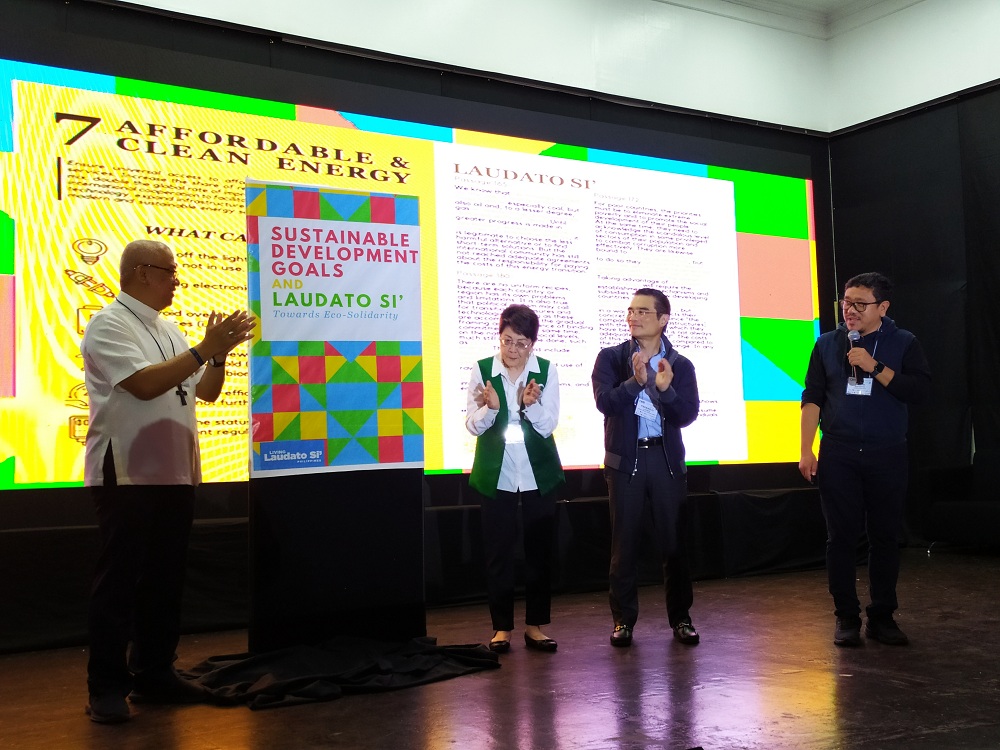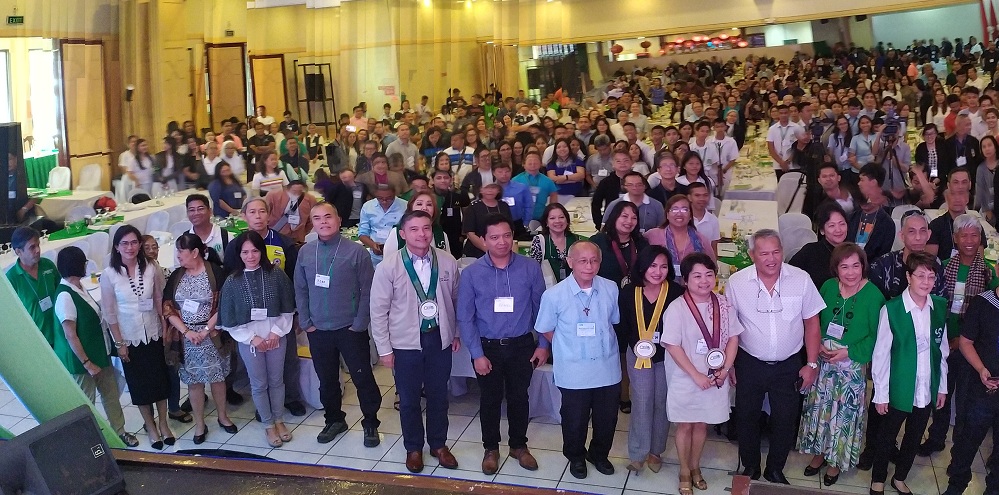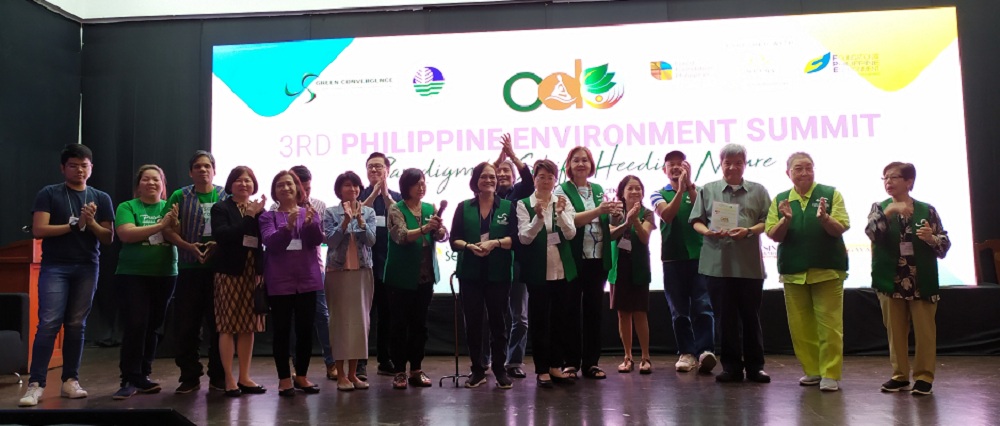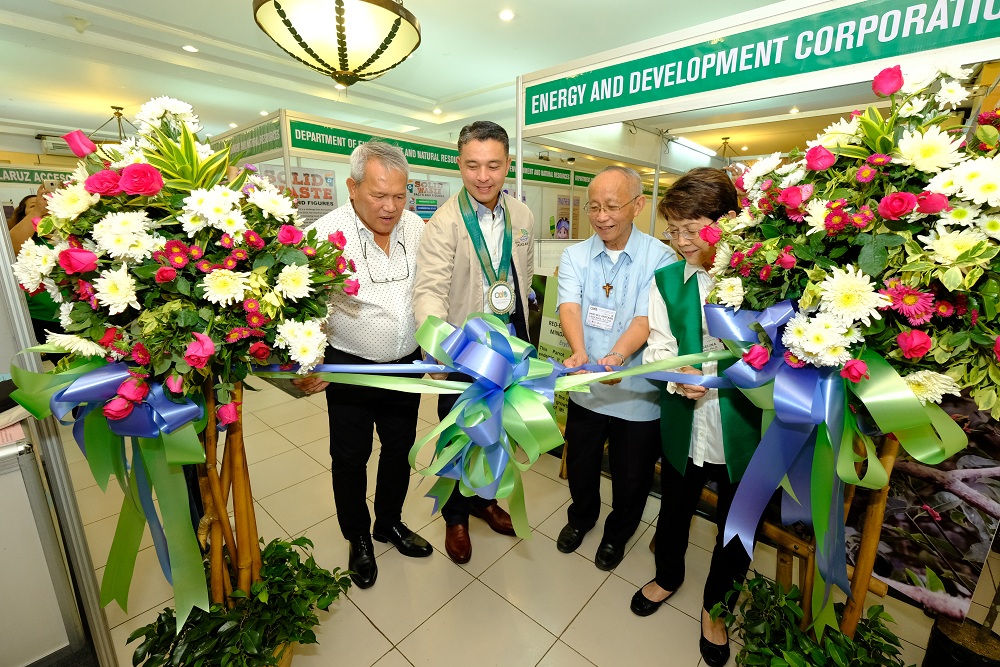
CAGAYAN DE ORO CITY – The 3rd Philippine Environment Summit closed here Friday afternoon with calls for paradigm shifts in Sustainability and Regeneration focusing on three key themes in Laudato si’, the second encyclical of Pope Francis subtitled “On care for Our Common Home”
Laodato si’ critiques consumerism and irresponsible development, laments environmental degradation and global warming, and calls all people of the world to take “swift and unified global action.”
In his closing address at the three-day summit, Xavier Ateneo President Roberto Yap, S.J. stressed the three key themes of the pope’s encyclical: The conviction that everything in the world is connected; The value proper to each creature; and, “Intimate relationship between the poor and the fragility of the planet.”
“Because all creatures are connected, each must be cherished with love and respect, for all of us as living creatures are dependent on one another,” Fr. Yap quoted.
“We are called to a companionship with Christ the Reconciler to participate in the Father’s work of reconciling humanity with Himself, of human beings with human beings, of humanity with creation. We are called to collaborate in the care of our common home.”
In attributing the value proper to each creature, Yap again quoted from Laudato si’ 69 and Psalms 104:31.
“We are called to recognize that other living beings have a value of their own in God’s eyes: “by their mere existence they bless him and give him glory” and indeed, “the Lord rejoices in all his works,” Yap quoted. Creation has a broader meaning than nature, for it has to do with God’s loving plan in which every creature has its own value and significance. (LS 71)
Quoting the Ecumenical Patriarch Bartholomew, Yap said Pope Francis emphasizes that “there is need for each of us to repent of the ways we have harmed the planet, for “inasmuch as we all generate small ecological damage”; we are called to acknowledge “our contribution, smaller or greater, to the disfigurement and destruction of creation”.
Yap noted how the Pope has repeatedly stated this firmly and persuasively, challenging us to acknowledge our sins against creation: “For human beings… to destroy the biological diversity of God’s creation; for human beings to degrade the integrity of the earth by causing changes in its climate, by stripping the earth of its natural forests or destroying its wetlands; for human beings to contaminate the earth’s waters, its land, its air, and its life – these are sins”.
For “to commit a crime against the natural world is a sin against ourselves and a sin against God”. (LS 8)
Not the least, Yap again quoted Laodato si’ 139 to describe the intimate relationship between the poor and the fragility of the planet.
“We are faced not with two separate crises, one environmental and the other social, but rather with one complex crisis which is both social and environmental.” (LS 139). We need “to hear both the cry of the earth and the cry of the poor” (LS 49)
He noted how most of the poor live in the ecologically fragile areas, the peripheries, where they are the main victims of environmental destruction.
“The poor have harder time coping and adapting to environmental disasters,” Yap said.
The three key main themes of Laodato si’ run through many of the 37 resolutions generated in the12 breakout sessions held over the summit’s three days:
“Unlearn to learn” from the indigenous people’s sacred tradition, knowledge and practices that protect and preserve the environment” (On Indigenous People’s Eco-Governance); “Promote sustainable, affordable, and regenerative agriculture” (on Organic Agriculture); “Promote Zero-Waste as a way of life in the household and barangay levels” (On Sustainable Barangays and Community Co-Governance); “Uphold Fair Trade that puts people and planet before financial profit” (On Non-Timber Forest Products); “Promote traditional practices that respect the integrity of the forest ecosystems” (On Ecosystems Protection); Speak of and Love the Truth in defense of The Environment’ (On Education & Research); and, “Reclaim our intimate connection with nature, deepen our collective spirituality of inter-relatedness and inter-dependence, and live it out through life-long commitment to preserve the environment that sustains life” (On Spirituality & Sustainability).

Little Daily Actions
Fr. Yap said the degenerating state of the global environment is a call to two-fold action at the Micro (Personal) and Macro (Structural) levels.
“There is nobility in the duty to care for creation through little daily actions, and it is wonderful how education can bring about real changes in lifestyle,” he stressed. “Education in environmental responsibility can encourage ways of acting which directly and significantly affect the world around us, such as avoiding the use of plastic and paper, reducing water consumption, separating refuse, cooking only what can reasonably be consumed, showing care for other living beings, using public transport or car-pooling, planting trees, turning off unnecessary lights, or any number of other practices.”
“All of these reflect a generous and worthy creativity which brings out the best in human beings. Reusing something instead of immediately discarding it, when done for the right reasons, can be an act of love which expresses our own dignity,” he added quoting from Laodato si’ 211.
“We must not think that these efforts are not going to change the world. They benefit society, often unbeknown to us, for they call forth a goodness which, albeit unseen, inevitably tends to spread. Furthermore, such actions can restore our sense of self-esteem; they can enable us to live more fully and to feel that life on earth is worthwhile.” (LS 212).

The call to seek other ways of understanding the economy and progress
Yap, who is an avowed fan of Pope Francis, noted how the Pope calls for economic solutions that have regard for human life, our natural environment, social equity and justice.
“Pope Francis invites all of us to help create a new and courageous culture that finds new ways to do business, promote human dignity and protect the environment,” he noted. “He writes, “We need to correct models of growth incapable of guaranteeing respect for the environment, openness to life, concern for the family, social equality, the dignity of workers and the rights of future generations.”
We need to build and promote a different kind of economy: “one that brings life not death, one that is inclusive and not exclusive, humane and not dehumanizing, one that cares for the environment and does not despoil it.”

Commitment
The summit resolutions acknowledged how “every sector has to do it part with openness, right paradigm and outlook.”
“Standing firm on our commitment to heed nature, to protect and preserve the environment; resolutely adhere to the aforesaid resolutions, synergize our actions that are socially inclusive, economically sustainable, and environmentally beneficial; and forge pathways toward a decarbonized and regenerative world.”
In closing, Yap acknowledged the partners who made the 3rd Summit possible: Department of Environment and Natural Resources, Energy Development Corporation, Forest Foundation Philippines, Foundation for the Philippine Environment, Kamayan Restaurant, Xavier University – Ateneo de Cagayan, Liceo de Cagayan University, Local Government of Cagayan de Oro, Archdiocese of Cagayan de Oro, Eco-Business, Business Week Mindanao, Mindanao Daily and the Metro Cagayan de Oro Times, and most of all to the organizer and host of the 3rd Philippine Environment Summit, Green Convergence.
-30-